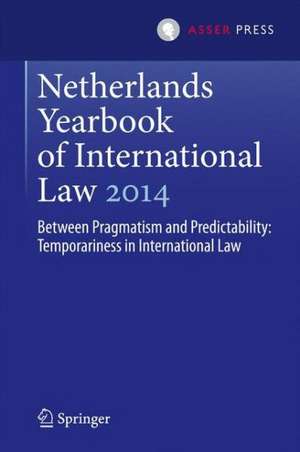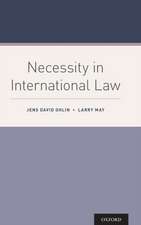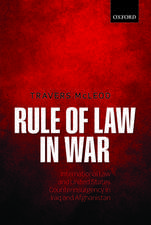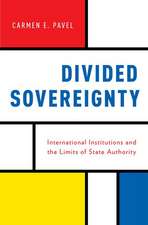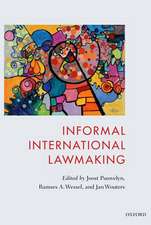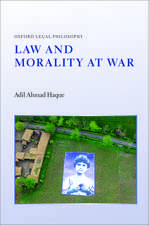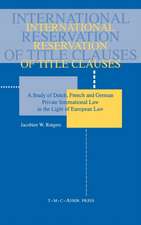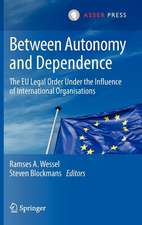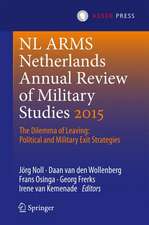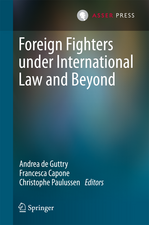Netherlands Yearbook of International Law 2014: Between Pragmatism and Predictability: Temporariness in International Law: Netherlands Yearbook of International Law, cartea 45
Editat de Mónika Ambrus, Ramses A. Wesselen Limba Engleză Hardback – 9 iun 2015
One of the key functions or purposes of international law (and law in general for that matter) is to provide long-term stability and legal certainty. Yet, international legal rules may also function as tools to deal with non-permanent or constantly changing issues and rather than stable, international law may have to be flexible or adaptive. Prima facie, one could think of two main types of temporary aspects relevant from the perspective of international law. First, the nature of the object addressed by international law or the ‘problem’ that international law aims to address may be inherently temporary (temporary objects). Second, a subject of international law may be created for a specific period of time, after the elapse of which this entity ceases to exist (temporary subjects). These types of temporariness raise several questions from the perspective of international law, which are hardly addressed from a more conceptual perspective. This volume of the Netherlands Yearbook of International Law aims to do exactly that by asking the question of how international law reacts to various types of temporary issues. Put differently, where does international law stand on the continuum of predictability and pragmatism when it comes to temporary issues or institutions?
Din seria Netherlands Yearbook of International Law
- 18%
 Preț: 1231.64 lei
Preț: 1231.64 lei - 27%
 Preț: 1449.70 lei
Preț: 1449.70 lei - 27%
 Preț: 1357.63 lei
Preț: 1357.63 lei - 27%
 Preț: 2165.55 lei
Preț: 2165.55 lei - 15%
 Preț: 654.30 lei
Preț: 654.30 lei - 20%
 Preț: 584.18 lei
Preț: 584.18 lei - 15%
 Preț: 650.69 lei
Preț: 650.69 lei - 15%
 Preț: 663.27 lei
Preț: 663.27 lei - 18%
 Preț: 971.49 lei
Preț: 971.49 lei - 15%
 Preț: 664.11 lei
Preț: 664.11 lei - 15%
 Preț: 661.84 lei
Preț: 661.84 lei - 15%
 Preț: 664.61 lei
Preț: 664.61 lei - 15%
 Preț: 658.70 lei
Preț: 658.70 lei - 15%
 Preț: 651.02 lei
Preț: 651.02 lei - 15%
 Preț: 653.14 lei
Preț: 653.14 lei - 20%
 Preț: 557.75 lei
Preț: 557.75 lei - 15%
 Preț: 644.95 lei
Preț: 644.95 lei - 15%
 Preț: 644.30 lei
Preț: 644.30 lei - 18%
 Preț: 959.82 lei
Preț: 959.82 lei - 18%
 Preț: 1229.91 lei
Preț: 1229.91 lei - 15%
 Preț: 641.53 lei
Preț: 641.53 lei - 18%
 Preț: 895.76 lei
Preț: 895.76 lei - 18%
 Preț: 952.26 lei
Preț: 952.26 lei - 18%
 Preț: 953.65 lei
Preț: 953.65 lei
Preț: 653.14 lei
Preț vechi: 768.40 lei
-15% Nou
Puncte Express: 980
Preț estimativ în valută:
124.98€ • 130.49$ • 103.44£
124.98€ • 130.49$ • 103.44£
Carte tipărită la comandă
Livrare economică 04-18 aprilie
Preluare comenzi: 021 569.72.76
Specificații
ISBN-13: 9789462650596
ISBN-10: 9462650594
Pagini: 428
Ilustrații: XII, 413 p.
Dimensiuni: 155 x 235 x 32 mm
Greutate: 0.77 kg
Ediția:2015
Editura: T.M.C. Asser Press
Colecția T.M.C. Asser Press
Seria Netherlands Yearbook of International Law
Locul publicării:The Hague, Germany
ISBN-10: 9462650594
Pagini: 428
Ilustrații: XII, 413 p.
Dimensiuni: 155 x 235 x 32 mm
Greutate: 0.77 kg
Ediția:2015
Editura: T.M.C. Asser Press
Colecția T.M.C. Asser Press
Seria Netherlands Yearbook of International Law
Locul publicării:The Hague, Germany
Public țintă
ResearchCuprins
Between Pragmatism and Predictability: Temporariness International Law.- Temporariness and Change in Global Governance.- Temporary International Legal Regimes as Frames for Permanent Ones.- The International Rule of Law Time after Time: Temporary Institutions between Change and Continuity.- International Law and Time: A Reflection of the Temporal Attitudes of International Lawyers through Three Paradigms.- (Inter)Temporal Considerations in the Interpretative Process of the VCLT: Do Treaties Endure, Perdure or Exdure?.- Shifting Demands In International Institutional Law: Securing The United Nations’ Accountability For The Haitian Cholera Outbreak.- Protecting Human Rights During Emergencies: Delegation, Derogation and Deference.- Temporary Protection: Hovering at the Edges of Refugee Law.- Between the Devil and the Deep Blue Sea: Enhancing Flexibility in International Climate Change Law.- Commissions of Inquiry: Flexible Temporariness or Permanent Predictability?.- Special Temporary Measures and the Norm of Equality.- Paradise Postponed? For a Judge-led Generic Model of International Criminal Procedure and an End to ‘Draft-as-You-Go’.- Platforms, Protestors and Provisional Measures: The Arctic Sunrise Dispute and Environmental Activism at Sea.
Textul de pe ultima copertă
The Netherlands Yearbook of International Law was first published in 1970. It offers a forum for the publication of scholarly articles of a more general nature in the area of public international law including the law of the european Union.
One of the key functions or purposes of international law (and law in general for that matter) is to provide long-term stability and legal certainty. Yet, international legal rules may also function as tools to deal with non-permanent or constantly changing issues, and rather than stable, international law may have to be flexible or adaptive. Prima facie, one could think of two main types of temporary aspects relevant from the perspective of international law. First, the nature of the object addressed by international law or the ‘problem’ that international law aims to address may be inherently temporary (temporary objects). Second, a subject of international law may be created for a specific period of time, after the elapse of which this entity ceases to exist (temporary subjects). These types of temporariness raise several questions from the perspective of international law, which are hardly addressed from a more conceptual perspective. This volume of the Netherlands Yearbook of International Law aims to do exactly that by asking the question of how international law reacts to various types of temporary issues. Put differently, where does international law stand on the continuum of predictability and pragmatism when it comes to temporary issues or institutions?
One of the key functions or purposes of international law (and law in general for that matter) is to provide long-term stability and legal certainty. Yet, international legal rules may also function as tools to deal with non-permanent or constantly changing issues, and rather than stable, international law may have to be flexible or adaptive. Prima facie, one could think of two main types of temporary aspects relevant from the perspective of international law. First, the nature of the object addressed by international law or the ‘problem’ that international law aims to address may be inherently temporary (temporary objects). Second, a subject of international law may be created for a specific period of time, after the elapse of which this entity ceases to exist (temporary subjects). These types of temporariness raise several questions from the perspective of international law, which are hardly addressed from a more conceptual perspective. This volume of the Netherlands Yearbook of International Law aims to do exactly that by asking the question of how international law reacts to various types of temporary issues. Put differently, where does international law stand on the continuum of predictability and pragmatism when it comes to temporary issues or institutions?
Caracteristici
Timely book on the topic of temporariness Makes comparisons on temporariness across various fields of international law Valuable for those interested in general public international law as for those interested in specific subfields Written by a team of experts with extensive academic experience Includes supplementary material: sn.pub/extras
